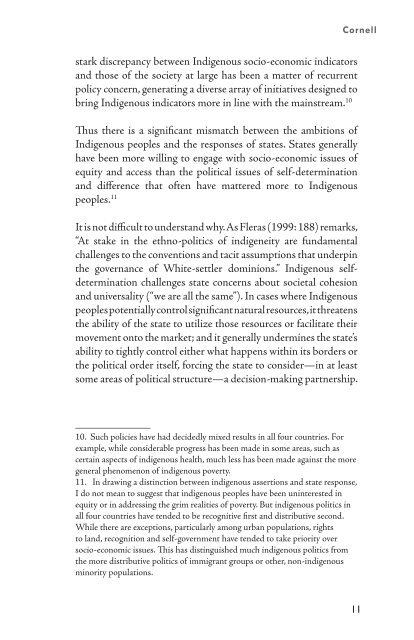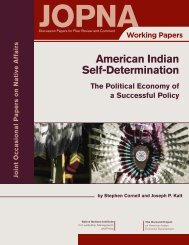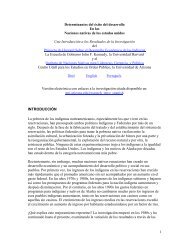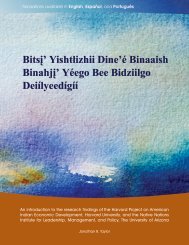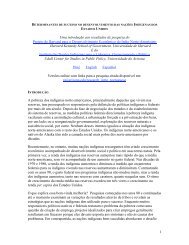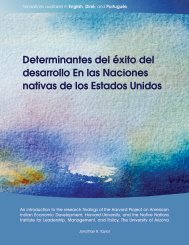Indigenous Peoples, Poverty, and Self-Determination in Australia ...
Indigenous Peoples, Poverty, and Self-Determination in Australia ...
Indigenous Peoples, Poverty, and Self-Determination in Australia ...
You also want an ePaper? Increase the reach of your titles
YUMPU automatically turns print PDFs into web optimized ePapers that Google loves.
Cornellstark discrepancy between <strong>Indigenous</strong> socio-economic <strong>in</strong>dicators<strong>and</strong> those of the society at large has been a matter of recurrentpolicy concern, generat<strong>in</strong>g a diverse array of <strong>in</strong>itiatives designed tobr<strong>in</strong>g <strong>Indigenous</strong> <strong>in</strong>dicators more <strong>in</strong> l<strong>in</strong>e with the ma<strong>in</strong>stream. 10Thus there is a significant mismatch between the ambitions of<strong>Indigenous</strong> peoples <strong>and</strong> the responses of states. States generallyhave been more will<strong>in</strong>g to engage with socio-economic issues ofequity <strong>and</strong> access than the political issues of self-determ<strong>in</strong>ation<strong>and</strong> difference that often have mattered more to <strong>Indigenous</strong>peoples. 11It is not difficult to underst<strong>and</strong> why. As Fleras (1999: 188) remarks,“At stake <strong>in</strong> the ethno-politics of <strong>in</strong>digeneity are fundamentalchallenges to the conventions <strong>and</strong> tacit assumptions that underp<strong>in</strong>the governance of White-settler dom<strong>in</strong>ions.” <strong>Indigenous</strong> selfdeterm<strong>in</strong>ationchallenges state concerns about societal cohesion<strong>and</strong> universality (“we are all the same”). In cases where <strong>Indigenous</strong>peoples potentially control significant natural resources, it threatensthe ability of the state to utilize those resources or facilitate theirmovement onto the market; <strong>and</strong> it generally underm<strong>in</strong>es the state’sability to tightly control either what happens with<strong>in</strong> its borders orthe political order itself, forc<strong>in</strong>g the state to consider—<strong>in</strong> at leastsome areas of political structure—a decision-mak<strong>in</strong>g partnership.10. Such policies have had decidedly mixed results <strong>in</strong> all four countries. Forexample, while considerable progress has been made <strong>in</strong> some areas, such ascerta<strong>in</strong> aspects of <strong>in</strong>digenous health, much less has been made aga<strong>in</strong>st the moregeneral phenomenon of <strong>in</strong>digenous poverty.11. In draw<strong>in</strong>g a dist<strong>in</strong>ction between <strong>in</strong>digenous assertions <strong>and</strong> state response,I do not mean to suggest that <strong>in</strong>digenous peoples have been un<strong>in</strong>terested <strong>in</strong>equity or <strong>in</strong> address<strong>in</strong>g the grim realities of poverty. But <strong>in</strong>digenous politics <strong>in</strong>all four countries have tended to be recognitive first <strong>and</strong> distributive second.While there are exceptions, particularly among urban populations, rightsto l<strong>and</strong>, recognition <strong>and</strong> self-government have tended to take priority oversocio-economic issues. This has dist<strong>in</strong>guished much <strong>in</strong>digenous politics fromthe more distributive politics of immigrant groups or other, non-<strong>in</strong>digenousm<strong>in</strong>ority populations.11


